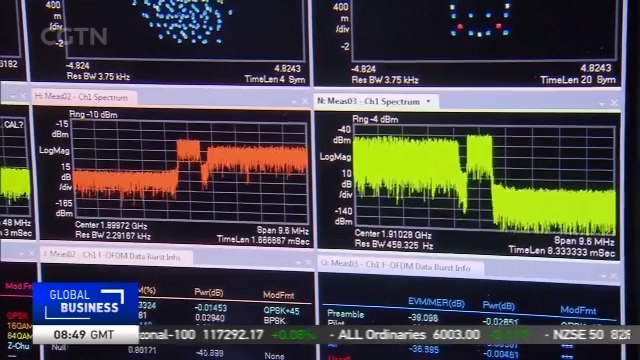
19:46, 26-Apr-2018
5G is Coming: Ready or not
02:39

Have you ever wish you could surf the Internet faster? Wouldn't it be nice to be able to download a movie in just one second? Well, these may not be daydreams for too much longer. China is likely to launch its first 5G mobile phone service in the second half next year, according to a statement by the Ministry of Industry and Information Technology over the weekend. Yu Wen takes a closer look on what the launch might mean.
5G is coming, but just what is it? Technically it means a cell phone tower can talk directly to your phone and to your phone only -- it doesn't have to spread its signals over thousands of phones all at once. That means the signals are stronger, faster, and can go farther. China's first real-time test of 5G technology began in Chongqing earlier this week, with tests designed for virtual reality games, autonomous driving, smart city monitoring, and artificial intelligence applications. The experts are happy to explain that 5G technology can be applied to much more than just these fields, however.
HE RENLONG, CHIEF SCIENTIST CHINA INFORMATION AND COMMUNICATION RESEARCH INSTITUTE EAST CHINA AFFILIATION "5G's bigger potential area of applications lies in the Internet of things, such as intelligent road lighting and, for example, sensors to allow the monitoring of water quality at long distance."
Despite all this, there are people who are pouring cold water on the technology. The chairman of China's biggest telecom equipment maker, Huawei, told a conference on Tuesday that at first most consumers would not notice the difference between current 4G communications and the coming 5G technology. Building out 5G will also be very expensive for operators, requiring tens of thousands of new base stations nationwide. Analysts are concluding that only the biggest players will be able to survive in tomorrow's telecoms market.
CARL LI, SENIOR PARTNER ALLBRIGHT LAW OFFICES "In China, China Mobile seems that they are now more advanced. I think they have more city network, and invest much more money on this, but for some new competitors, new companies still will be difficult because of so huge investment and so big network. I don't think new players can do this."
Good news comes in pairs, however. The Ministry of Industry and Information Technology announced today that China's data roaming charge will be eliminated as soon as July 1st. The ministry also pledged to lower broadband fees by 10-15% for small and medium-sized companies.

SITEMAP
Copyright © 2018 CGTN. Beijing ICP prepared NO.16065310-3
Copyright © 2018 CGTN. Beijing ICP prepared NO.16065310-3